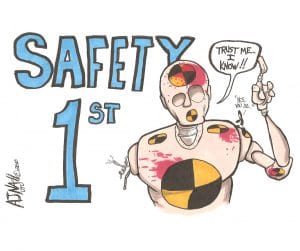RED OAK, Iowa — A BNSF conductor and an engineer were killed in a rear-end train accident near here Sunday morning, April 17.
Red Oak is southeast of Council Bluffs and is part of BNSF’s Creston subdivision, which has centralized traffic control, according to the Federal Railroad Administration.
Killed were conductor and UTU Local 199 (Creston, Iowa) Vice Local Chairperson Patricia Hyatt, and engineer Tom Anderson, both age 48. Hyatt, a resident of Creston, hired on with BNSF in March 2005. Anderson was president of BLET Division 642.
A BNSF spokesperson was quoted in news reports that an eastbound freight train pulling 130 loaded coal hoppers collided with the rear of a second BNSF train pulling 34 cars of railroad maintenance equipment. The accident occurred around 7 a.m, Central Daylight Time.
Reports say 10 of the cars in the lead train, two locomotives of the three-locomotive coal train and the two locomotives of the maintenance train derailed.
Witnesses to the accident told the Des Moines Register newspaper that the lead locomotive of the coal train was engulfed in fire, which spread to at least one of the coal cars.
There were no reported injuries of the two-person crew of the maintenance train.
The tracks on which the accident occurred are used by Amtrak’s California Zephyr as well as 40 freight trains daily, according to the BNSF spokesperson. Reportedly, the line linking Galesburg, Ill., and Omaha will be closed indefinitely, with trains rerouted to other track.
The FRA and National Transportation Safety Board are investigating the accident, and a member of the UTU Transportation Safety Team is assisting the NTSB in its investigation.
Hyatt is the first UTU member killed in an on-duty accident in 2011.
In March, a conductor trainee was killed — as was an engineer and a crew-van driver — in Kelso, Wash., when the crew van was struck by a BNSF freight train at a private highway-rail grade crossing. UTU conductor Dwight Hauck, a member of UTU Local 324, was seriously injured in that accident.
In February, UTU conductor Alvin (A.J.) Boguess, a member of UTU Local 623, was seriously injured when he fell 55-feet from a CSX rail bridge over the Jackson River during a switching movement in Covington, W.Va.
And earlier this year, a BLET member, Stanley Watts, was killed in a Norfolk Southern switching accident in Kankakee, Ill.
Eight UTU members were killed in on-duty accidents in 2010, and eight were killed in on-duty accidents in 2009.
Hyatt, daughter of Evan Aubrey Shiver and Christine (Elliott) Shiver, was born Feb. 25, 1963, in Fort Ord, Calif. She graduated from Crystal River High School in Crystal River, Fla. She went on to study for two years in college and served six years in the U.S. Army.
Online condolences may be given under the obituary category at www.powersfh.com.
 Eventually, these assessments will complement other programs such as safety inspections of railcars and injury reporting.
Eventually, these assessments will complement other programs such as safety inspections of railcars and injury reporting.